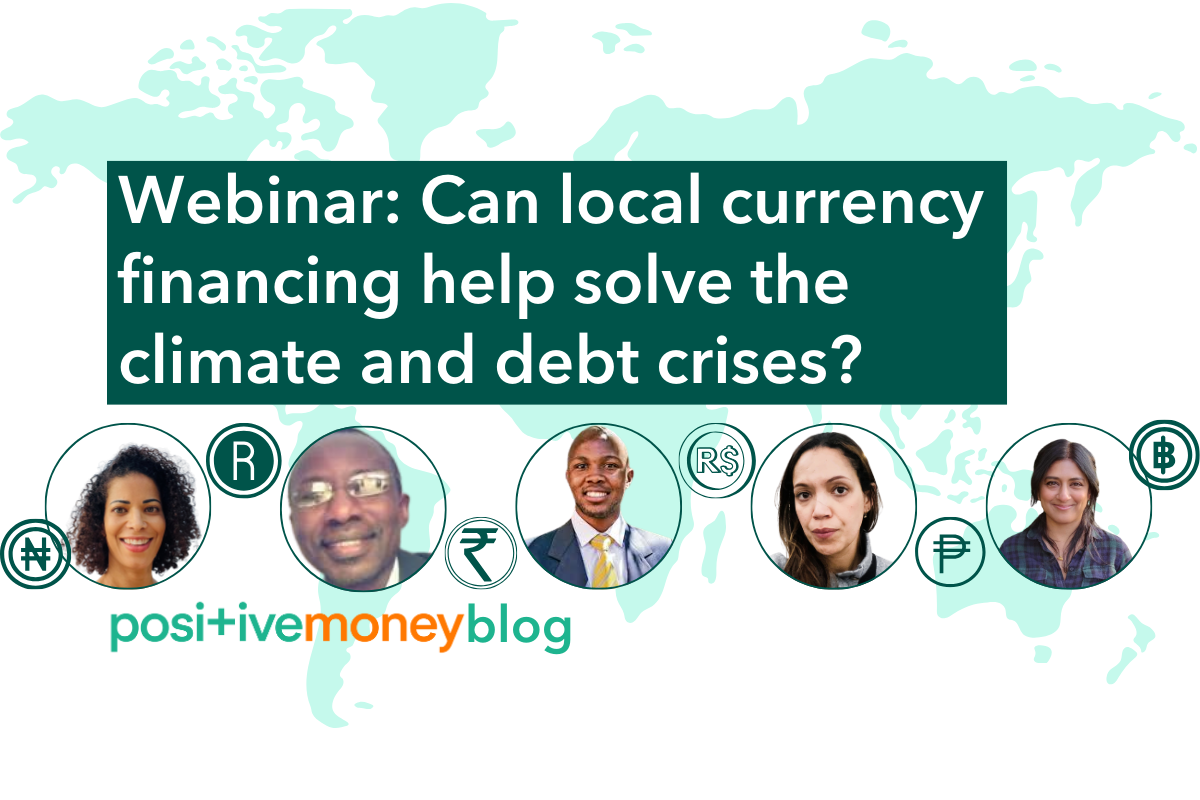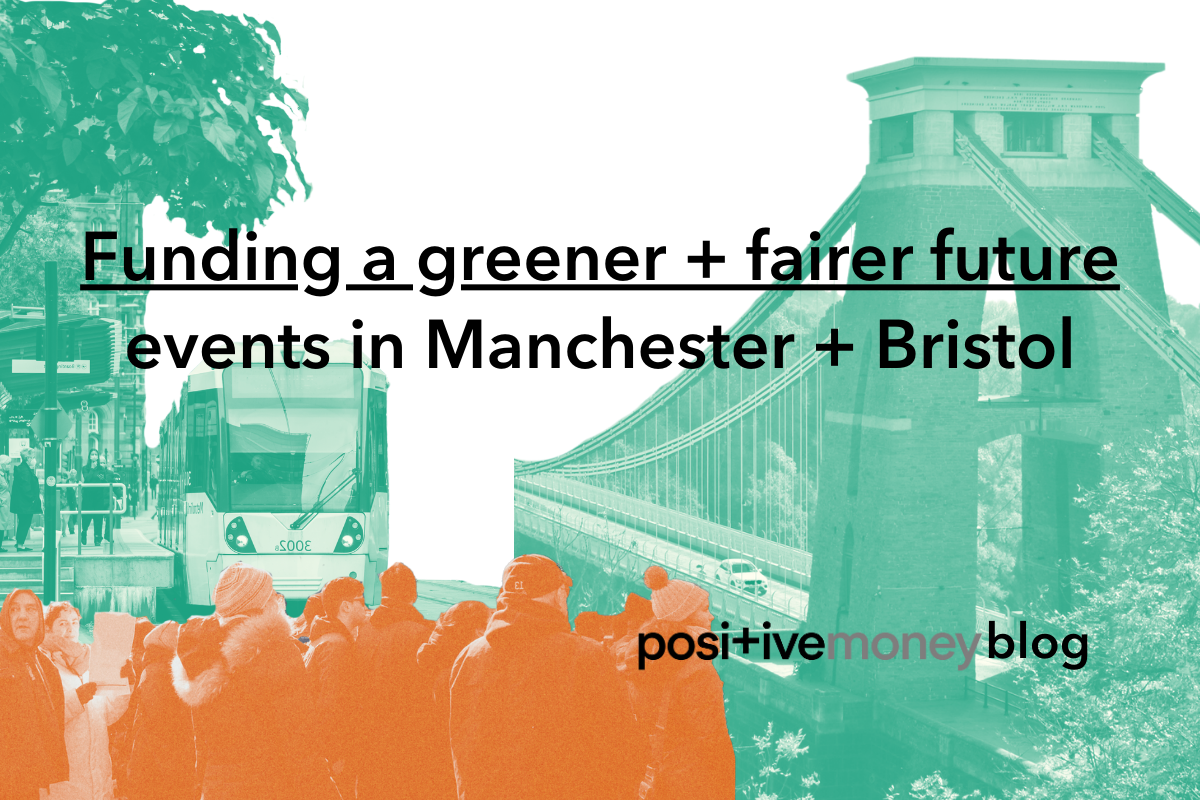
UKGlobal
27 January 2026
In March, we hosted two in-person events on how we could finance a just green transition in two English cities with big green ambitions.
At the end of March, we headed to Manchester and Bristol and welcomed speakers and attendees from across the cities, to discuss how we can fund a green and fairer future.
The climate crisis is the biggest challenge facing communities both in the UK and around the world; threatening lives, livelihoods, nature, and biodiversity. With the UK Climate Change Committee’s most recent carbon budget outlining the need for £26 billion of investment every year between now and 2050, funding a just green transition is no longer a question of why - but how - that’s what our events aimed to address.

Our Head of Campaigns, Hannah Dewhirst, kicked things off by giving an introduction to Positive Money, our work on green finance and the role of the Bank of England, and a whistle-stop tour of just three of the opportunities we’re calling for that would mobilise and redirect billions in public and private finance:
greening the Bank of England’s collateral framework to exclude fossil fuel assets from the reserves private banks must hold at the central bank to operate in the UK,
the (seigniorage) benefits that’d come from introducing a digital pound and would create an extra £15-30 billion in new public revenue, and
powering up the National Wealth Fund (NWF); a newly created public finance body with an explicitly green mandate. The NWF is a huge opportunity to invest in clean energy, retrofitting, and green jobs across the UK but currently risks capture by the private sector, and mission creep given recent remarks from Rachel Reeves to expand into defense industries. See our briefing for more details about our recommendations.
Next up was Sean Benstead, a Senior Researcher at the Centre for Local Economic Strategies (CLES). Sean spoke about the principles of community wealth building and the power place-based ‘anchor’ institutions; like hospitals and local councils, can have in transforming ownership models and practices, to prevent profit extraction by multi-national corporations and instead, keep and reap the benefits of local spending in local places. He gave an overview of the Oldham Green New Deal, a council-led initiative aimed at decarbonising their local energy system with £5 billion in local green infrastructure, “to benefit the local community, not distant shareholders”, which also targets support at households in the most disadvantaged areas, helping to put the ‘just’ in just transition.
Our third presentation in Manchester was given by Chloe Jeffries, a core organiser of Climate Emergency Manchester, a citizens initiative formed in 2019 following the wave of council’s climate emergency declarations. Chloe outlined how local authority and council funding is stuck in a rut of grant hand-out models, with staff forced to spend valuable time bidding against each other, taking resources away from implementation and preventing long-term planning - a key consideration in climate work. She highlighted how contrary to official opinion, volunteers and community organisers are more than willing to get stuck into the bureaucracy and financing of local projects when the outcome matters to them, with the example of planning regulations for new local green spaces - which one attendee later personally attested to given her work with the Castlefield Viaduct sky garden - and the success of participatory budgeting projects.
Chloe finished by advocating for an end to cycles of dependency and over-reliance on outdated models of financing, citing Manchester city council’s revenue from Manchester airport which results in a lack of scrutiny, and an appeal to officials; “don’t hide the f-word from citizens” - no one should be scared off from finance.
In Bristol, we first heard from Dr Alix Dietzel, a senior lecturer in climate justice at the University of Bristol. Alix stressed the importance of taking a holistic approach when transitioning to a post-carbon economy, to widen the goal posts beyond net-zero and pollution metrics, to encompass equity and social inclusion. She highlighted local schemes including Bristol’s Clean Air Zone, which raised £26 million in its first year to fund new bus routes and cycle networks, and Ambition Lawrence Weston, a collaborative project with the University of Bristol, providing green skills opportunities to residents in a newly-opened community hub, in response to barriers accessing training elsewhere. With local authorities and housing associations contributing towards a pipeline of retrofitting work, and a new council-led Climate Action Investment scheme - that residents can join for as little as £5 - it was joyful to hear so many reasons for optimism.
Dr Dietzel also highlighted the lack of diversity within the environmental sector, both in terms of ethnicity and class, and the harmful impact this has on decision-making. Since if important debates are forgetting, or even worse purposely excluding, parts of our communities then the decisions they make will not only lack legitimacy but fail in the aspiration to achieve a truly just transition for everyone.
The final speaker we welcomed in Bristol was Frances Northop; Head of Community Economic Power at the New Economics Foundation (NEF) and a Co-Director of Abundance. Frances emphasised how we can’t rely on the private sector - driven as it is both legally and culturally by the shareholder profit model - to deliver a just green transition for local communities, and must instead explore public commons partnership and alternative forms of ownership, to return decision-making power, and the positive outcomes which flow from these investments, back into local people’s hands. She also shared some uplifting examples including a solar cooperative farm and retrofit reimagined neighbourhoods.
After the presentations, we broke into informal discussions over food and drink. Questions and topics included the accessibility of the term ‘community wealth building’ and how best to communicate it, appetite for alternative models like economist Kate Raworth’s Doughnut, how we can diversify the economics curriculum to bring in issues of climate and justice, and the need for electoral reform to go hand-in-hand with new fiscal and monetary policies in order to truly transform our political and economic systems.
Every conversation engaged in and overheard was fruitful and we received positive feedback from both events; “a really thought provoking and useful event” (in spite of some tech gremlins in Bristol!) “it was very informative and worthwhile. Glad I came and sorry to have to leave early!”
The origin of these events dates back to February 2024, when the Labour party u-turned on their annual commitment of £28 billion in green spending. Since then, a litany of public spending cuts by the new government; from keeping the two-child benefit cap, ending the universal Winter Fuel Payment for pensioners, and mostly recent slashing disability benefits, are more evidence of a short-sighted and dangerous adherence to fiscal rules at the expense of the wider wellbeing of people and planet. But it’s not all doom and gloom.
That’s precisely what these events aimed to highlight, that there are so many opportunities and appetite from people to reform and raise funds at the local, regional, and national level to build a greener and fairer future for all of us. And that it’s our responsibility, in the face of those who claim we can’t afford it, to stand up, share these ideas, and make the case that - given the climate crisis - we simply can’t afford not to.
__
Many thanks to our videographers; Kooj Chuhan and Nico Talakshi, and our venues; Manchester’s Mechanics Conference Centre and Bristol’s The Station.
If you haven’t already, sign-up to our mailing list for regular updates or donate to support our work to redesign our economic system for social justice and a liveable planet.
